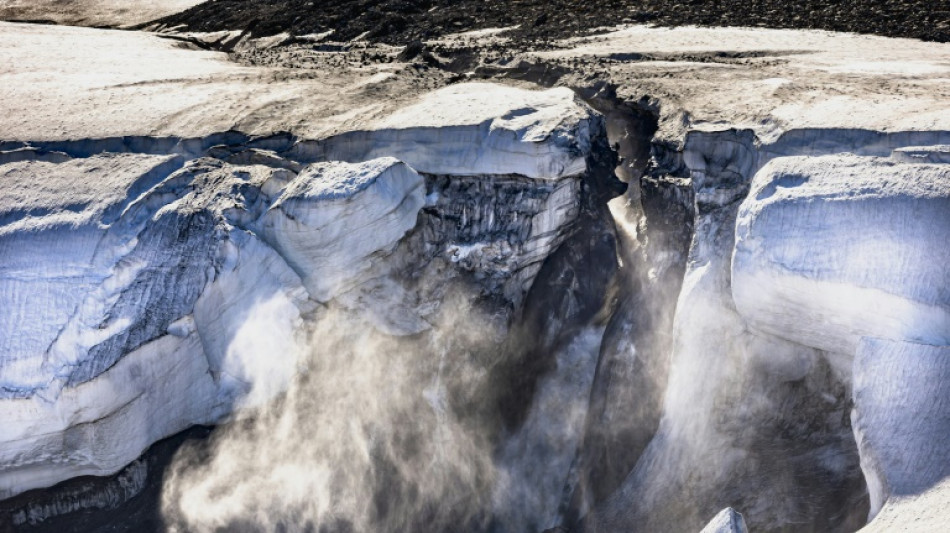
-
 Digital divas: Can Japan's virtual YouTuber craze crack America?
Digital divas: Can Japan's virtual YouTuber craze crack America?
-
WHO pandemic agreement talks face deadline crunch

-
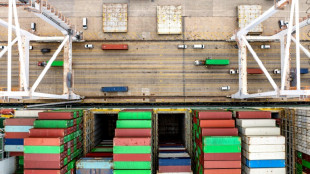 Stocks, dollar sink and gold hits record as Trump tariff panic returns
Stocks, dollar sink and gold hits record as Trump tariff panic returns
-
LeMond hails 'one in a million' Pogacar ahead of Paris-Roubaix debut

-
 Liverpool can move closer to the title as top five tension mounts
Liverpool can move closer to the title as top five tension mounts
-
Trump admits trade war 'cost' as markets hit

-
 AI only just beginning to revolutionize the NBA game
AI only just beginning to revolutionize the NBA game
-
Despite Trump pause, overall US tariff rate at highest in a century

-
 'A pain that doesn't subside' at funerals for Dominican nightclub disaster victims
'A pain that doesn't subside' at funerals for Dominican nightclub disaster victims
-
Panama deal allows US to deploy troops to canal

-
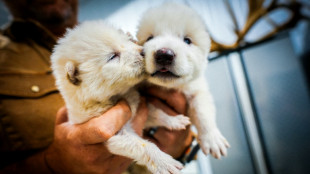 US firm says it brought back extinct dire wolves
US firm says it brought back extinct dire wolves
-
Grieving Dominicans start burying 220 victims of nightclub disaster
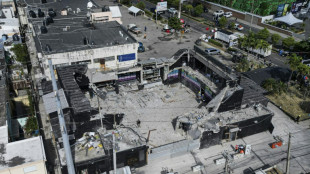
-
 Aberg closes strong at 'sneaky hard' Augusta National
Aberg closes strong at 'sneaky hard' Augusta National
-
US auto union praises some Trump tariffs

-
 Australian IVF clinic admits embryo mix-up
Australian IVF clinic admits embryo mix-up
-
Rose: I've played well enough to win Masters but lack the jacket

-
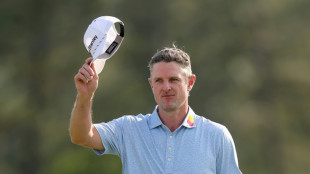 Rose again enjoys 'luxury' of first-round Masters lead
Rose again enjoys 'luxury' of first-round Masters lead
-
Rose rockets to Masters lead, defending champ Scheffler in pursuit

-
 Tesla opens first showroom in oil-rich Saudi
Tesla opens first showroom in oil-rich Saudi
-
Oscars to add new award for stunts

-
 Hatton loves being at Masters but 'It's just so hard'
Hatton loves being at Masters but 'It's just so hard'
-
'Mistakes can happen': Amorim backs Onana after Lyon nightmare

-
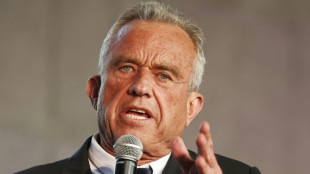 RFK Jr says study will reveal cause of autism 'epidemic'
RFK Jr says study will reveal cause of autism 'epidemic'
-
Tourist family, pilot killed in 'tragic' NY helicopter crash
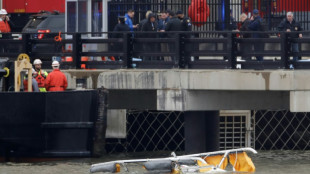
-
 No.1 Scheffler makes strong Masters start to defend title
No.1 Scheffler makes strong Masters start to defend title
-
Man Utd and Spurs draw in Europa League, Rangers hold Athletic

-
 Rose rockets to Masters lead with Scheffler and McIlroy in pursuit
Rose rockets to Masters lead with Scheffler and McIlroy in pursuit
-
Man Utd held late in Lyon after Onana errors in Europa League

-
 Man Utd held late in Lyon after Onana errors
Man Utd held late in Lyon after Onana errors
-
Wall Street rally fizzles as tariff fears resurface

-
 MLS to open 'second phase' of major season overhaul study
MLS to open 'second phase' of major season overhaul study
-
Argentina braves 24-hour strike as it awaits word on IMF loan

-
 Spain's Ballester finds relief in Masters water hazard
Spain's Ballester finds relief in Masters water hazard
-
Porro rescues Postecoglou as Spurs held by Frankfurt

-
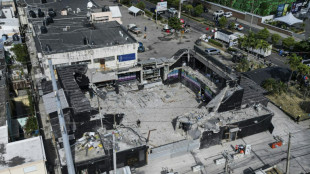 Grieving Dominicans start burying 200+ victims of nightclub disaster
Grieving Dominicans start burying 200+ victims of nightclub disaster
-
CONMEBOL proposes one-off 64-team World Cup in 2030

-
 Rybakina on form for Kazakhstan in BJK Cup
Rybakina on form for Kazakhstan in BJK Cup
-
Former Real Madrid coach Leo Beenhakker dies aged 82

-
 Rose rockets to top of Masters leaderboard, Scheffler one back
Rose rockets to top of Masters leaderboard, Scheffler one back
-
Langer fades after fiery start in Masters farewell

-
 Iran, US raise stakes ahead of key talks in Oman
Iran, US raise stakes ahead of key talks in Oman
-
US-China confrontation overshadows Trump's 'beautiful' trade war

-
 RFK, MLK assassination files to be released in 'next few days'
RFK, MLK assassination files to be released in 'next few days'
-
Relevent settle anti-trust lawsuit with US Soccer

-
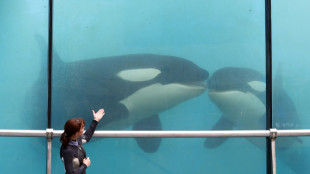 Orcas, dolphins stuck in closed French marine park
Orcas, dolphins stuck in closed French marine park
-
Rahul shines as Delhi bag fourth straight win in IPL

-
 Family bid farewell to merengue singer, killed in Dominican nightclub disaster
Family bid farewell to merengue singer, killed in Dominican nightclub disaster
-
Mbappe ups stakes in bid to recoup 55mn euros from PSG

-
 Scheffler grabs share of early lead in quest for Masters repeat
Scheffler grabs share of early lead in quest for Masters repeat
-
Why did a Dominican nightclub roof cave in?
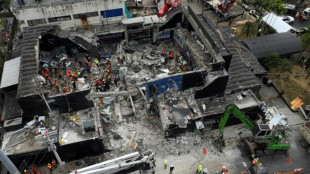

Risk of climate tipping points escalates at 1.5C warming: study
Failing to achieve the Paris agreement goal of limiting global warming to 1.5C could trigger multiple dangerous "tipping points" where changes to climate systems become self-sustaining, according to a major new study published in Science.
Even current levels of warming have already put the world at risk of five major tipping points -- including the collapse of the Antarctic and Greenland ice sheets -- but it's not too late to change course, the authors stress.
"The way I think about it is it'll change the face of the world -- literally if you were looking at it from space," given long term sea-level rise, rainforest death and more, senior author Tim Lenton of the University of Exeter told AFP.
Lenton authored the first major research on tipping points in 2008.
These points are defined as a reinforcing feedback in a climate system that is so strong it becomes self-propelling at a certain threshold -- meaning even if warming stopped, an ice sheet, ocean or rainforest would keep changing to a new state.
While early assessments said these would be reached in the range of 3-5C of warming, advances in climate observations, modeling and paleoclimate reconstructions of periods of warming in the deep past have found the thresholds much lower.
The new paper is a synthesis of more than 200 studies to produce new estimates for when common tipping points might happen.
It identifies nine global "core" tipping elements contributing substantially to planetary system functioning, and seven regional tipping points, which contribute substantially to human welfare, for a total of 16.
Five of the 16 may be triggered at today's temperatures: the collapse of the Greenland and West Antarctic ice sheets; widespread abrupt permafrost thaw; collapse of convection in the Labrador Sea; and massive die-off of tropical coral reefs.
Four of these move from "possible" events to "likely" at 1.5C global warming, with five more becoming possible around this level of heating.
- 10 meters of sea rise -
Passing the tipping points for the Greenland and West Antarctic ice sheets is "making a commitment eventually to an extra 10 meters of global sea level," said Lenton, though this particular change may take hundreds of years.
Coral reefs are already experiencing die-offs due to warming-induced bleaching, but at current temperatures they are also able to partly recover.
At a particular level of heating, recoveries would no longer be possible, devastating equatorial coral reefs and the 500 million people globally who depend on them.
The Labrador Sea convection is responsible for warming Europe and changes could result in much more severe winters, comparable to the "Little Ice Age" from the early 14th century through the mid-19th century.
Abrupt permafrost thaw -- impacting Russia, Scandinavia, and Canada -- would further amplify carbon emissions in addition to drastically altering landscapes.
Systems that may come into play around 1.5C also include the Atlantic Meridional Overturning Circulation, closely linked to sea levels on the US East Coast.
Starting from 2C, monsoon rains in West Africa and the Sahel could be severely disrupted, and the Amazon rainforest could face widespread "dieback," turning to savanna.
First author David Armstrong McKay stressed that even if the planet did hit 1.5C warming, much would depend on how long it stayed there, with the worst impacts coming if the temperature remained that hot for five or six decades.
Further, "these tipping points happening at 1.5 degrees don't add a vast amount of global warming as a feedback -- and that's quite important because it means we're not on a runaway train situation at 1.5C."
That means humanity can still control further warming, and it's "still worthwhile cutting emissions as fast as we possibly can," he added.
Lenton said what gave him hope was the idea that human society might have its own "positive" tipping points, where years of incremental change are followed by urgent, widespread action.
"That's how I can get out of bed in the morning... Can we transform ourselves and the way we live?" he said.
O.Johnson--AMWN


